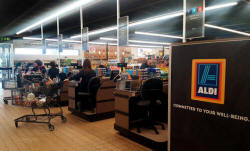|
Exclusive: Aldi raises
stakes in U.S. price war with Wal-Mart
 Send a link to a friend
Send a link to a friend
 [May 11, 2017]
By Nandita Bose [May 11, 2017]
By Nandita Bose
WHEATON,
Ill. (Reuters) - German grocery chain Aldi Inc is trying to beat the
world's biggest retailer at its own game: low prices.
Already with 1,600 U.S. stores, Aldi’s internal studies show its prices
are 21 percent lower than its lowest-priced rivals, including Wal-Mart
Stores Inc <WMT.N>, according to Chief Executive Jason Hart. He plans to
maintain that gap going forward.
His strategy, previously unreported, centers on adding more
private-label goods, which are a retailer's in-house brands, to win over
price-sensitive customers, and a massive expansion to further disrupt a
U.S. grocery sector that has seen 18 companies go bankrupt since 2014.
Hart's plan calls for spending $1.6 billion to expand and remodel 1,300
U.S. stores, and open 400 new stores mainly in Florida, Texas and on
both coasts by end of 2018. He also pledged Aldi will be willing to
change prices more frequently to respond to rivals if needed.
"We are re-merchandising, remodeling, enhancing our product range and
are focused on gaining volume so more customers start their shopping at
Aldi and we are able to complete their shopping lists moreso than we
have in the past," said Hart, who added Aldi's U.S. sales have doubled
in five years.

Though it only accounts for only about 1.5 percent of the U.S. grocery
market, Aldi is growing at 15 percent a year, whereas Wal-Mart currently
controls about 22 percent of the market and its U.S. sales are estimated
to grow about 2 percent this year, according to analysts.
Aldi's growth potential has competitors taking notice. Reuters reported
in February that Wal-Mart is running price tests in 11 states, pushing
vendors to undercut Aldi and other rivals by 15 percent and is expected
to spend about $6 billion to regain its title as the low-price leader.
For a graphic, click http://tmsnrt.rs/2le6v0Y
Price wars are roiling the entire retail sector - from department stores
to discount chains - but it is nowhere as intense as in the grocery
sector. Beyond Wal-Mart's move to match Aldi on price, German discount
chain Lidl plans to open up to a 100 U.S. stores in a year, and
Amazon.com Inc <AMZN.O> is aggressively testing out various
brick-and-mortar grocery formats along with growing Amazon Fresh, its
grocery delivery service. For a graphic, click http://tmsnrt.rs/2qRbNT9
"We have not seen anything like this in the grocery sector in the United
States before," said Scott Mushkin, managing director of Wolfe Research
and a leading pricing analyst.
Such heated competition risks a dangerous race to the bottom that could
result in more retailers shutting their doors.
"Given Aldi's expansion, Lidl's entry, Wal-Mart's response and Amazon's
growing ambitions in this space, it is fair to expect a significant
acceleration in the bankruptcy and liquidation cycle in this sector over
the next few years," said Burt Flickinger, managing director at retail
consultancy Strategic Resource Group. For more on Wal-Mart's stock
performance vs Amazon, click [L1N1IC270]

GOAL: EVERYDAY LOW PRICING
Aldi, has a simple strategy to win more customers: everyday low pricing,
according to Hart.
"We don't confuse our customers with yo-yo discounts, sales, coupons and
loyalty cards that require membership fees," he said.
Four analysts and consultants contacted by Reuters confirmed Aldi now
offers the lowest prices in private label consumer products in the
states it operates, although they did say Wal-Mart is gaining ground in
the states they are conducting price tests.
[to top of second column] |

Shoppers are pictured at Aldi, a retail grocery store chain in
Wheaton, Illinois, U.S., April 13, 2017. REUTERS/Nandita Bose

Depending on the product, Aldi's prices are cheaper than most rivals' private
label items and even most branded items, analysts said. Hart said the 21 percent
difference in price is calculated by monitoring competition on a basket of
groceries.
Aldi
counts on its no-frills shopping experience to help keep costs low, and limits
much of its inventory to items that sell in huge volume. But its focus on
offering far more private label items than branded products is central to
allowing Aldi to adjust pricing whenever it chooses, Hart said.
Aldi and Wal-Mart do no break out the figures, but analysts including Mushkin
and Flickinger say Aldi carries about 1,200 stock keeping units (SKUs) or type
of products, 90 percent of which are private label. Wal-Mart stocks about
30,000-40,000 SKU's of products similar to ones Aldi sells, and only 30 percent
of that are private labels.
That
different product mix can potentially make it more difficult for Wal-Mart to
adjust prices because it often first needs buy-in from suppliers, and many times
faces push back from packaged goods makers like Procter & Gamble <PG.N>,
Unilever <ULVR.L> and even smaller brands. Such vendors fear steep discounting
can erode the value of their brands, analysts said.
A Wal-Mart spokesman declined comment, saying the company would not comment on a
competitor's strategy. P&G and Unilever did not respond to Reuters requests
seeking comment.
But the explosive growth in private label products is on the radar of Wal-Mart
Chief Executive Doug McMillon. Last month he told analysts that private label
goods will play an even more important role as the widespread availability of
branded products online will compress those products margins over time.
"Aldi
is disrupting the sector the way Wal-Mart did when they started," said Strategic
Resource Group's Flickinger.

STEPPING UP THE GAME
Aldi's aggressive push to remodel its stores will allow it to add new private
label merchandise in rapidly growing categories like fresh food.
"The remodels are aimed at increasing our volumes which means more purchasing
power that will help us lower prices further," said Scott Patton, Aldi's vice
president of corporate buying.
At a recent visit to an Aldi store in Wheaton, Illinois Reuters found
newer-looking shelves, wider aisles and brighter lighting than a typical Aldi
store. There was also a bigger assortment of fresh, organic, gluten-free
products and antibiotic-free meats versus what it stocked earlier - categories
Aldi said is growing the most rapidly at its stores.
For example, its Simply Nature range of private-label products grew 53 percent
to $300 million in 2016 from a year ago.
Aldi has also opened stores close to Wal-Mart's supercenters to benefit from its
budget-conscious shoppers. Its total store count of 2,000 stores by the end of
next year will be about 42 percent of Wal-Mart's U.S. store base.
(editing by David Greising and Edward Tobin)
[© 2017 Thomson Reuters. All rights
reserved.] Copyright 2017 Reuters. All rights reserved. This material may not be published,
broadcast, rewritten or redistributed. |